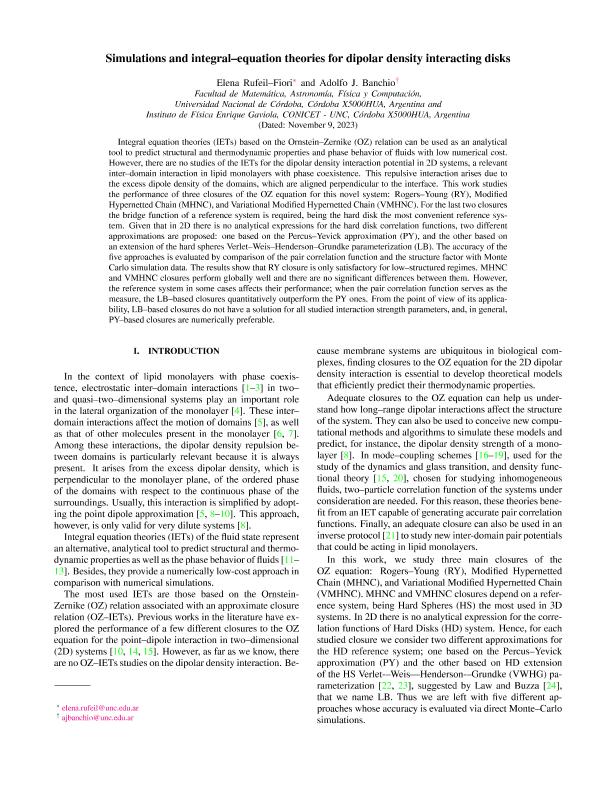Artículo
Simulations and integral–equation theories for dipolar density interacting disks
Fecha de publicación:
12/2023
Editorial:
American Physical Society
Revista:
Physical Review E: Statistical, Nonlinear and Soft Matter Physics
ISSN:
1539-3755
e-ISSN:
2470-0053
Idioma:
Inglés
Tipo de recurso:
Artículo publicado
Clasificación temática:
Resumen
Integral equation theories (IETs) based on the Ornstein–Zernike (OZ) relation can be used as an analytical tool to predict structural and thermodynamic properties and phase behavior of fluids with low numerical cost. However, there are no studies of the IETs for the dipolar density interaction potential in 2D systems, a relevant inter-domain interaction in lipid monolayers with phase coexistence. This repulsive interaction arises due to the excess dipole density of the domains, which are aligned perpendicular to the interface. This work studies the performance of three closures of the OZ equation for this novel system: Rogers–Young (RY), Modified Hypernetted Chain (MHNC), and Variational Modified Hypernetted Chain (VMHNC). For the last two closures the bridge function of a reference system is required, being the hard disk the most convenient reference system. Given that in 2D there is no analytical expressions for the hard disk correlation functions, two different approximations are proposed: one based on the Percus–Yevick approximation (PY), and the other based on an extension of the hard spheres Verlet–Weis–Henderson–Grundke parameterization (LB). The accuracy of the five approaches is evaluated by comparison of the pair correlation function and the structure factor with Monte Carlo simulation data. The results show that RY closure is only satisfactory for low–structured regimes. MHNCand VMHNC closures perform globally well and there are no significant differences between them. However, the reference system in some cases affects their performance; when the pair correlation function serves as the measure, the LB–based closures quantitatively outperform the PY ones. From the point of view of its applica-bility, LB–based closures do not have a solution for all studied interaction strength parameters, and, in general, PY–based closures are numerically preferable.
Palabras clave:
monolayers
,
integral equaiton theory
,
density dipolar interaction
,
structure
Archivos asociados
Licencia
Identificadores
Colecciones
Articulos(IFEG)
Articulos de INST.DE FISICA ENRIQUE GAVIOLA
Articulos de INST.DE FISICA ENRIQUE GAVIOLA
Citación
Rufeil Fiori, Elena; Banchio, Adolfo Javier; Simulations and integral–equation theories for dipolar density interacting disks; American Physical Society; Physical Review E: Statistical, Nonlinear and Soft Matter Physics; 108; 6; 12-2023; 1-16
Compartir
Altmétricas




